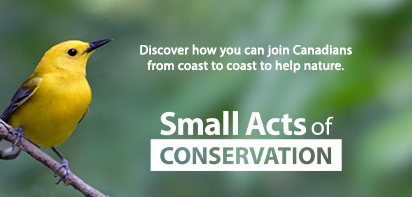Crucial nesting habitat for federally endangered piping plovers protected by the Nature Conservancy of Canada
Freshwater wetlands, salt marsh and coastal shoreline now conserved near Escuminac
There is encouraging news for federally endangered piping plovers in New Brunswick. The Nature Conservancy of Canada (NCC) is today announcing a conservation victory in the northeastern section of the province.
The not-for-profit organization has purchased 29 hectares of freshwater wetlands and coastal shoreline on an undisturbed stretch of the Northumberland Strait.
Located 10 kilometres north of Kouchibouguac National Park and south of NCC’s Point Escuminac Nature Reserve, this new parcel of land is located within a vital habitat for nesting piping plovers. Escuminac beaches are one of a few remaining areas in the province for piping plovers to breed, nest and raise their young, free of human disturbances.
The new parcel includes rich wetlands, low-lying coastal salt marsh, bogs, dunes, eel grass beds, tidal flats and sandy beaches. It is located within an identified Important Bird Area and is an ecological sanctuary for over 20 varieties of shorebirds, including semipalmated sandpipers, least sandpipers, sanderlings, semipalmated plovers, and piping plovers which are listed as endangered under the federal Species at Risk Act.
NCC’s partner Birds Canada actively monitors piping plovers and other shorebirds in the area. Piping plovers have been observed nesting on the new NCC property and feeding at an adjacent tidal flat near the mouth of the Escuminac River. A variety of waterfowl have also been observed offshore and in large ponds, including great blue heron, common loon, common Eider, black scoter, common goldeneye and several other species of ducks. Bald eagle, osprey and northern harrier have also been spotted cruising the open wetlands.
The project was made possible by funding from the Government of Canada, through the Natural Heritage Conservation Program, part of Canada’s Nature Fund. Other contributions were made by private donors. The project was funded in part by the U.S. Fish and Wildlife Service, through the North American Wetlands Conservation Act.
This announcement highlights how NCC is accelerating the pace of conservation in Canada. In the past two years alone, NCC has influenced the protection of more than 1 million hectares (almost twice the size of Prince Edward Island), coast to coast to coast. Over the next few years, the organization will double its impact by mobilizing Canadians and delivering permanent, large-scale conservation.
In the face of rapid biodiversity loss and climate change, nature is our ally. There is no solution to either without nature conservation. When nature thrives, we all thrive.
Quotes
“The twin crises of climate change and biodiversity loss are two sides of the same coin, and we must tackle them together. By working with partners such as the Nature Conservancy of Canada, we are helping to protect the natural environment in New Brunswick and across the country. Protecting lands plays a vital role in helping to halt and reverse biodiversity loss and contributes to the recovery of species at risk. Through the Natural Heritage Conservation Program, the Government of Canada is making progress toward its goal of conserving a quarter of lands and oceans in Canada by 2025, working toward 30 percent of each by 2030.” – The Honourable Steven Guilbeault, Minister of Environment and Climate Change Canada
“We are pleased for this opportunity to expand upon our Point Escuminac Nature Reserve. The new conservation land is vital to the sustainability of endangered piping plovers in the area.” – Denise Roy, New Brunswick Conservation Representative, Nature Conservancy of Canada
Facts
- Global populations of piping plover are estimated to be between 7,600 and 8,400 individuals. Plover habitats are highly susceptible to human disturbances and impacted by the effects of climate change.
- New Brunswick’s sandy beaches along the Northumberland Strait provide critical breeding habitat for 25 per cent of the province’s population of the nationally endangered piping plover.
About
The Nature Conservancy of Canada (NCC) is the country’s unifying force for nature. NCC seeks solutions to the twin crises of rapid biodiversity loss and climate change through large-scale, permanent land conservation. As a trusted partner, NCC works with people, communities, businesses and government to protect and care for our country’s most important natural areas. Since 1962, NCC has brought people together to conserve and restore more than 15 million hectares. In Atlantic Provinces, NCC has protected 35,970 hectares.
The Government of Canada’s Natural Heritage Conservation Program (NHCP) is a unique public-private partnership to support new protected and conserved areas by securing private lands and private interests in lands. The program is managed by the Nature Conservancy of Canada (NCC). Federal funds invested in the program are matched with contributions raised by NCC and its partners, Ducks Unlimited Canada and the country’s land trust community.
Learn more
To learn more about NCC’s work in New Brunswick and how to contribute, visit: www.natureconservancy.ca/en/where-we-work/new-brunswick
Learn More
Follow us on on X (formerly Twitter): x.com/NCC_CNC | x.com/NCC_CNCMedia
Find us on Facebook
- 30 -




